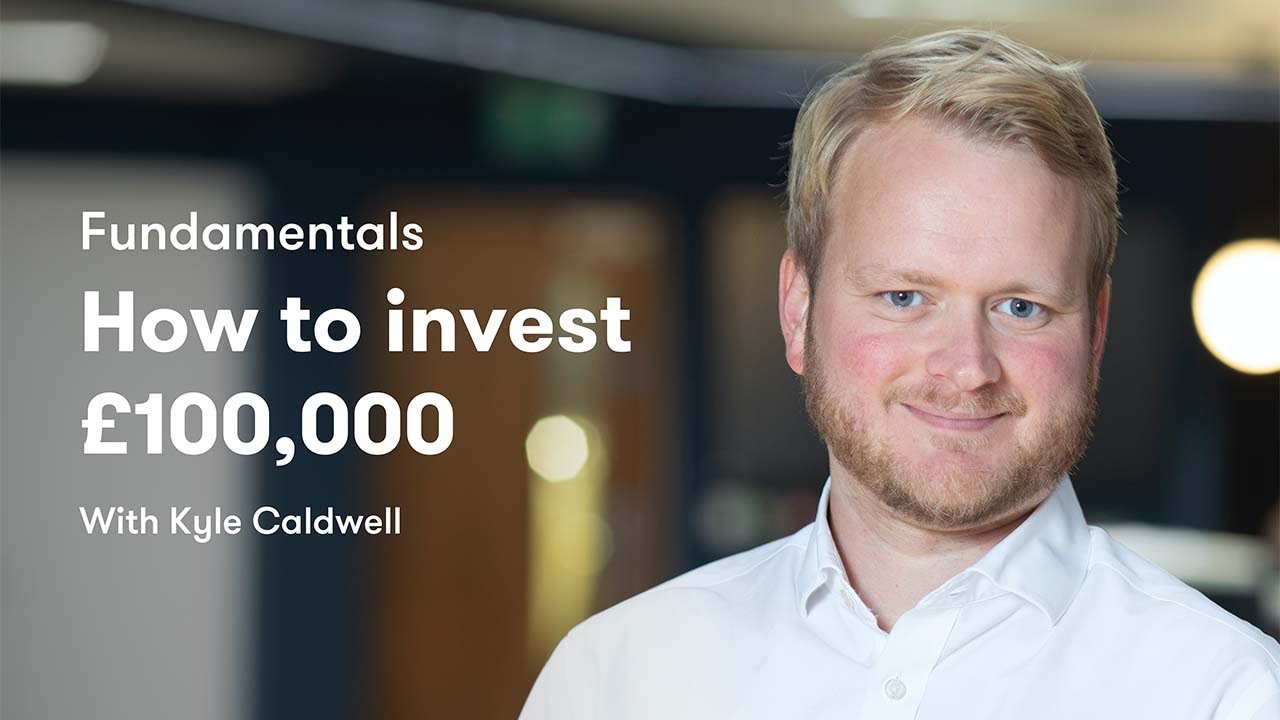Tax hub
£100,000 is a life-changing amount of money; but it’s not necessarily an easy amount to invest.
To ensure you make the most of your windfall you’ll need to think carefully about where to invest £100,000 and keep tax front of mind. Without careful planning, tax could take a significant bite out of your returns.
In this guide to investing £100,000 find out how to build a diversified portfolio and the steps you can take to ensure you don’t pay more tax than necessary.

Before you start
Before you invest any of your £100,000, it’s a good idea to look at your current circumstances.
If you have any expensive debts like credit cards or loans, pay them off. The interest you’re paying on them will likely outstrip the returns you’ll make investing.
Mortgage rates tend to be lower, but if you want to be mortgage-free as soon as possible, you might also want to consider overpaying your mortgage. This can save thousands in interest, but it’s important to check the terms of your loan. Many will limit overpayments to 10% of your outstanding loan; you might need to wait until you remortgage to pay off larger sums.
Building a £100,000 portfolio
Successful investing isn’t about singling out a top-performing fund or getting the best return on £100,000; it’s about building a portfolio that can deliver the income or growth that you need over the years.
A balanced portfolio will normally be made up of a variety of different assets, including cash, fixed-interest securities and equities (stock market-linked investments).
Cash
Savings accounts aren’t ideal for investing huge sums of money because growth will be limited and over the years its spending power is likely to be reduced by inflation.
Nonetheless it’s always important to make sure you have enough money in easy access accounts to cover emergencies; experts typically recommend three to six months’ expenses.
If you’ve got any need for cash lump sums in the next five years, for example for holidays, a wedding or a house deposit, it’s sensible to keep that money in a savings account too. Fixed-rate savings accounts normally pay more than instant access but you’ll need to be able to park your money for a year or more.
Fixed-interest securities
Investing in fixed-interest means lending your money to businesses (corporate bonds) or governments (gilts or government bonds) in return for a fixed-rate of interest.
On the risk spectrum bonds normally sit between cash and stocks and shares, but some bonds will be riskier than others. Bonds with a lower credit rating and a greater chance of default will pay a higher yield than lower risk bonds with a better credit rating.
Bonds can be a way of reducing risk in a portfolio and are also a helpful diversifier as they don’t perform in the same way as shares.
You can invest in gilts or corporate bonds directly, or in a fund that invests in a basket of bonds on your behalf.
Stocks and shares
When you buy stock, you are buying a share or equity in a company. This means that the value of your investment will rise and fall in line with the performance of that business.
You can buy shares in individual companies or via a collective investment such as a fund, investment trust or ETF, that gives you access to a portfolio of shares in one holding.
Stock market-linked investments are higher risk than cash or fixed interest, but if you have enough time (five years at the least) they should generate better returns.
Those are likely to be the key components of a balanced £100,000 portfolio, but there are other assets you might want to consider.
Commodities
Commodities are investments in natural resources that are mined, grown or processed. Common examples include metals like gold, copper and tin.
Some funds specialise in commodities. Alternatively you can try exchange traded commodities or ETCs.
Property
Investors can access commercial property (think retail outlets, offices and warehouses) by investing in a commercial property fund. In addition to providing a steady income (from rent payments), commercial property can be a helpful way of diversifying your portfolio.
Alternatively, you might like the idea of investing £100,000 in a buy-to-let, but it’s important to be aware that increasing taxes for landlords is making it harder for new investors to make money from property. You will also have some exposure to residential property already, if you own your own home.
Asset allocation for £100,000
Which assets you use and how much of your portfolio they comprise is known as asset allocation.
There’s no one-size fits all portfolio. The exact asset allocation for you will depend on your short-term need for cash, your goals and your attitude to risk.
The more heavily your portfolio is skewed to equities, the higher risk it’s likely to be. However, the longer you have until you need the money, the more risk you can normally afford to take. You can always reduce the risk of your portfolio over time to lock in gains as you get closer to the end of your investment horizon.
Open an account
Whether you are looking for a general trading account, an ISA or a SIPP, we’ve got you covered with a low, flat fee.
Personal Pension (SIPP).
Get pension peace of mind with our four-time Which? Recommended Personal Pension (SIPP). Invest yourself or let our experts handle your investments for you.
Stocks & Shares ISA.
Get tax-free investing all wrapped up with our award-winning ii ISA. Take care of your own investments or let us manage them for you.
Managed ISA.
Let us manage your ISA for you. Save time, leave it to the experts and feel confident in your investment goals - all for a low monthly subscription.
Important information: The ii SIPP is for people who want to make their own decisions when investing for retirement. As investment values can go down as well as up, you may end up with a retirement fund that’s worth less than what you invested. Usually, you won’t be able to withdraw your money until age 55 (57 from 2028). Before transferring your pension, check if you’ll be charged any exit fees and make sure you don't lose any valuable benefits such as guaranteed annuity rates, lower protected pension age or matching employer contributions. If you’re unsure about opening a SIPP or transferring your pension(s), please speak to an authorised financial adviser.
Income or growth?
When deciding how to invest £100,000, you’ll also need to decide whether your priority is to grow your capital or generate an income from it.
If income is your priority (helpful if you’re in retirement and no longer working) you’ll want to prioritise dividend-paying investments that distribute a share of profits to investors. By choosing income units when you buy funds (look for ‘Inc’ at the end of the fund’s name), dividends will be paid directly into your chosen account. You might also want to consider fixed-interest securities, commercial property and high-interest savings accounts.
If increasing your capital is your priority, it’s worth seeking out investments with a growth strategy. You can still use income-generating funds but should choose so-called accumulation units (those with ‘Acc’ at the end of the fund’s name) which means income will be reinvested.
Getting your investments started
Online investment platforms offer a wide choice of investments from shares and funds through to investment trusts, ETFs and ETCs.
Charges can put a drag on your returns though, so when you’re investing £100,000 it’s vital you shop around to get the best value for money.
Interactive Investor offers a choice of flat-fee options, rather than percentage fees. This means that your costs don’t rise as your investment grows.
Investing tax effectively
When you join an investment platform you’ll be given a choice of different accounts.
It’s important to choose wisely to ensure you don’t pay more tax than you need.
Each will offer the same choice of investments but the tax treatment will differ.
- Stocks and shares ISA: Any money held in an ISA is tax-free. That means there’s no tax to pay while it grows or when you take money out. You can also access money in an ISA whenever you wish. The catch, if you want to invest £100,000, is that you can only invest £20,000 in an ISA each year. You can, however, sell other investments in future years and rebuy them in your ISA in a process known as Bed and ISA. This means that you can gradually shelter more of your wealth from tax over time. You just need to take care that you don’t trigger a capital gains tax liability.
- SIPP: A pension is also a very tax-effective way of investing. Your money will be sheltered from tax while it’s invested but the real attraction is that your contributions benefit from tax relief, equivalent to the rate of income tax you pay. You can, however, only access your pension once you turn 55 (rising to 57 in 2028). Each year you can invest a total of 100% of your income (up to £60,000) in pensions. In future years you can also use Bed and SIPP rules to move other investments into your SIPP, so long as you don’t exceed the annual allowance.
Do I need financial advice to invest £100,000?
You can invest £100,000 without advice. However, if you aren’t sure what to do it could be a sensible investment, especially if you’re a higher earner as your tax position is likely to be more complicated.
As a general rule, the more money you’re investing, the stronger the argument for financial advice becomes.
A financial adviser will view your finances holistically and put in place a plan that will help you achieve your goals. They will also be able to structure it in a way that reduces the amount of tax you need to pay.
